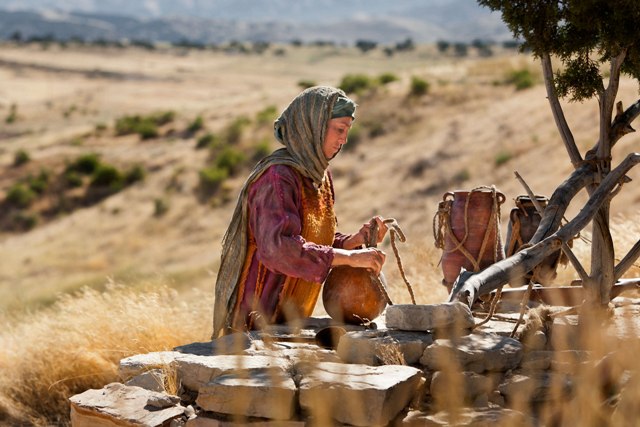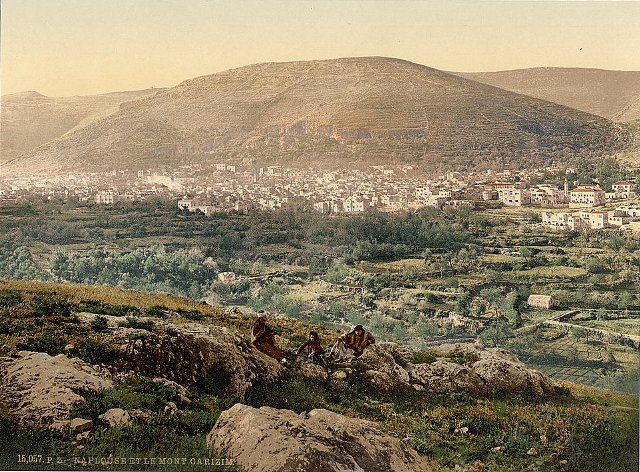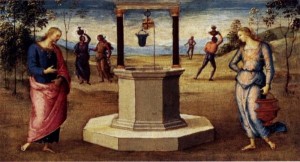 All four Gospels speak of the Lord’s departure to Galilee. St. Matthew and St. Mark note that this took place after John’s imprisonment, while St. John adds that the reason for this was the rumor that Jesus was acquiring and baptizing more disciples than John the Baptist, although the Evangelist explains that it was not He Himself Who was baptizing them, but His disciples. After John’s imprisonment, the Pharisees’ entire hostility focused on Jesus, Who began to seem to them more dangerous than the Baptist. Since the time of His suffering had not yet arrived, Jesus leaves Judea and goes to Galilee, in order to avoid persecution by His envious opponents. Only one Evangelist, St. John, tells the story of Christ’s conversation with the Samaritan woman that occurred on the way to Galilee.
All four Gospels speak of the Lord’s departure to Galilee. St. Matthew and St. Mark note that this took place after John’s imprisonment, while St. John adds that the reason for this was the rumor that Jesus was acquiring and baptizing more disciples than John the Baptist, although the Evangelist explains that it was not He Himself Who was baptizing them, but His disciples. After John’s imprisonment, the Pharisees’ entire hostility focused on Jesus, Who began to seem to them more dangerous than the Baptist. Since the time of His suffering had not yet arrived, Jesus leaves Judea and goes to Galilee, in order to avoid persecution by His envious opponents. Only one Evangelist, St. John, tells the story of Christ’s conversation with the Samaritan woman that occurred on the way to Galilee.
The Lord’s way lay through Samaria, the area located to the north of Judea and formerly belonging to three tribes of Israel: Dan, Ephraim, and Manasseh. There was a city in this area called Samaria, the former capital of the Israelite government. The Assyrian king Shalmaneser had conquered the Israelites and led them into captivity, settling pagans from Babylon and other places in their place. It was from the mixing of these settlers with the remaining Jews that the Samaritans arose. They accepted the Five Books of Moses and worshipped Yahweh, but did not forget their own gods. When the Jews returned from the Babylonian captivity and began to restore the Temple of Jerusalem, the Samaritans also wanted to take part, but the Jews rejected them. Therefore they erected their own temple on Mount Gerizim. While accepting the Books of Moses, the Samaritans rejected the writings of the Prophets and the entire tradition. For this reason, the Jews treated them as worse than pagans, avoiding any contact with them whatsoever, loathing and despising them.
 Passing through Samaria, the Lord and His disciples stopped to rest near a well that, according to tradition, had been dug by Jacob near a town named Shechem, which St. John calls Sychar. It is possible that the Evangelist employed this name in mockery, restructuring it from the word shakar (“ply with wine”) or sheker (“lie”). St. John indicates that it was about the sixth hour (noon, in our reckoning), the time of maximum heat, which most likely necessitated taking a rest. There cometh a woman of Samaria to draw water. Jesus’ disciples had gone to town to buy food. He turned to the Samaritan woman with a request: Give Me to drink. Probably knowing by His clothing or manner of speech that the one addressing her was a Jew, the Samaritan woman expressed her surprise that He (a Jew) would ask her (a Samaritan) for a drink, bearing in mind the Jews’ hatred and contempt for the Samaritans. But Jesus, Who had come into the world to save everyone, and not just the Jews, explains to the woman that she would not have posed such a question if she had known with Whom she was speaking and what good fortune (the gift of God) God had sent her through this encounter. If she only knew Who was asking her for a drink, she herself would ask Him to quench her spiritual thirst and reveal to her the truth that all people seek to know; and He would give her living water, by which is to be understood the grace of the Holy Spirit (cf., John 7:38).
Passing through Samaria, the Lord and His disciples stopped to rest near a well that, according to tradition, had been dug by Jacob near a town named Shechem, which St. John calls Sychar. It is possible that the Evangelist employed this name in mockery, restructuring it from the word shakar (“ply with wine”) or sheker (“lie”). St. John indicates that it was about the sixth hour (noon, in our reckoning), the time of maximum heat, which most likely necessitated taking a rest. There cometh a woman of Samaria to draw water. Jesus’ disciples had gone to town to buy food. He turned to the Samaritan woman with a request: Give Me to drink. Probably knowing by His clothing or manner of speech that the one addressing her was a Jew, the Samaritan woman expressed her surprise that He (a Jew) would ask her (a Samaritan) for a drink, bearing in mind the Jews’ hatred and contempt for the Samaritans. But Jesus, Who had come into the world to save everyone, and not just the Jews, explains to the woman that she would not have posed such a question if she had known with Whom she was speaking and what good fortune (the gift of God) God had sent her through this encounter. If she only knew Who was asking her for a drink, she herself would ask Him to quench her spiritual thirst and reveal to her the truth that all people seek to know; and He would give her living water, by which is to be understood the grace of the Holy Spirit (cf., John 7:38).
The Samaritan woman did not understand the Lord: she understood the living water to mean the water at the bottom of the well, for which reason she asked Jesus how He could reach the living water if He did not have anything to draw it up with, for the well was deep. Art Thou greater than our father Jacob, which gave us the well, and drank thereof himself, and his children, and his cattle? (John 4:12). She remembers the Patriarch Jacob with pride and love as the one who left use of this well to his offspring. Then the Lord raises her mind to the highest understanding of His words: Whosoever drinketh of this water shall thirst again: but whosoever drinketh of the water that I shall give him shall never thirst: but the water that I shall give him shall be in him a well of water springing up into everlasting life (John 4:13-14). In the spiritual life, grace-filled water has a different effect than that of physical water in bodily life. He who is filled with the grace of the Holy Spirit will never again experience spiritual thirst, inasmuch as all his spiritual needs have already been satisfied; whereas he who drinks physical water, just as when he satisfies other earthly needs, quenches his thirst only temporarily and soon shall thirst again.
Moreover, the grace-filled water will remain in man, forming a source within him springing up (skipping — the literal translation from Greek) into eternal life: that is, making the person a communicant of eternal life. Still not understanding the Lord, and thinking that He is speaking about ordinary water — only some special type that quenches thirst forever — she asks the Lord for some of this water to avoid the need of coming to the well for water. In order finally to make her understand that she is not speaking with an ordinary man, the Lord first orders her to call her husband, and then directly accuses her, who had already had five husbands, of now living in an adulterous union.
Seeing that before her was a prophet who knows that which is concealed, the Samaritan woman turns to Him for the resolution of the problem that greatly troubled the Samaritans in their relations with the Jews: who is correct in the dispute about the place for worshipping God? Was it the Samaritans who, following their fathers, built a temple on Mount Gerizim and worshiped God there? Or was it the Jews, who claimed that one could worship God only in Jerusalem? On the basis of Moses’ order to deliver a blessing on this mountain, the Samaritans used Mount Gerizim for their place of worship (Deuteronomy 11:29). Although John Hyrcanus, in 130 BC, had destroyed the temple they had erected there, they continued to offer sacrifices on the location of the ruined temple. Responding to the woman’s question, the Lord explains that it would be wrong to think that one can worship God only in one particular place and that the disputed question between the Samaritans and the Jews would soon lose its meaning on its own, because both types of divine worship — of both the Jewish and the Samaritan — would cease to exist in the nearest future. This prophecy was fulfilled when the Samaritans, decimated by wars, became disillusioned with the importance of their mountain, while Jerusalem was destroyed, and the Temple burnt, by the Romans in 70 AD.
Nonetheless, the Lord shows preference for Jewish worship – having in mind, of course, the fact that the Samaritans accepted only the Five Books of Moses while rejecting the Prophetic writings in which the teaching about the Person and Kingdom of the Messiah was laid out in detail. For salvation is of (will come from) the Jews, inasmuch as the Redeemer of mankind will come from the Jewish people. Then the Lord, elaborating on His previous thought, indicates that the hour cometh, and now is (since the Messiah had already appeared) – the time of the new, highest divine worship, which will not be limited to any single place, but will be everywhere, for it will be in spirit and in truth. Only such worship is true, since it corresponds to the nature of God Himself, Who is Spirit. Worshipping God in spirit and in truth means striving to please God not in outward form alone, but by means of true and wholehearted striving for God as Spirit, with all the strength of one’s spiritual being; that is, not by means of sacrificial offerings, which both the Jews and Samaritans performed – as if this was the only way to worship God – but by knowing and loving God, genuinely and un-hypocritically wishing to please Him through the fulfillment of His commandments. Worshiping God in in Spirit and in truth by no means excludes the outward, ritual side of worshipping God, as certain false teachers and sectarians attempt to affirm, but the main force is not contained in this outward side of divine worship. The ritual aspect of worshipping God should not be seen as anything objectionable: it is both essential and unavoidable, since man consists not only of soul, but also of body. Jesus Christ Himself worshiped God the Father physically, prostrating Himself to the ground, and did not reject similar worshiping of His own self from various people during His earthly life (cf., for example: Matthew 2:11, 14:33, 15:25; John 11:32, 12:3; and many other examples in the Gospels).

Mount Gerizim
The Samaritan woman seems to begin to understand the meaning of Jesus’ words, saying thoughtfully: I know that Messiah commeth, Which is called Christ: when He is come, He will tell us all things. The Samaritans were also awaiting the Messiah, calling Him Taheb in their language, basing this expectation on the words of Genesis 49:10, and especially on Moses’ words in Deuteronomy 18:18. The Samaritans’ understanding of the Messiah was not as corrupted as that of the Jews, inasmuch as they awaited Him as a prophet and not as a political leader. Therefore Jesus, Who had not called Himself the Messiah among the Jews, tells this simple Samaritan woman directly that He is the Messiah-Christ promised by Moses: I that speak unto thee am He [the Messiah]. Elated with joy from having seen the Messiah, the woman drops her water-pot at the well and hurries to the city to announce to everybody the coming of the Messiah – Who, as the Seer-of-hearts, had told her everything she had done. His disciples, arriving just then, were surprised that their Teacher was speaking with a woman, inasmuch as this was condemned by the rules of the Jewish rabbis, who had instructed: “Do not speak for long with a woman” and “Nobody should converse with a woman on the road, even with one’s lawful wife.” Likewise: “It is better to burn the words of the law, than to teach them to a woman.” However, showing reverence for their Teacher, the disciples did not express their astonishment in any way and simply asked Him to taste the food they had brought.
But Jesus the Man’s natural feeling of hunger stifled His joy over the Samaritan people turning to Him and their concern for salvation. He rejoiced that the seeds He had sown had already begun to produce a crop. Therefore He refused to satisfy His hunger, replying to His disciples that His true food was fulfilling the work of saving people conferred on Him by God the Father. The Samaritans that came to Him seemed to Jesus like a field ripe for harvest, while in the fields the harvest would take place only in four months. Ordinarily, he who sows the seeds reaps the harvest; with the sowing of seeds into the soul, the spiritual harvest more often than not is left to others. At the same time, the sower himself rejoices with the harvester, inasmuch as he did not sow for himself but for others. Therefore Christ says that He is sending the Apostles to reap the harvest on the spiritual field, which was first prepared and sown not by them, but by others: by the Old Testament Prophets and Him Himself. During these explanations, the Samaritans approached the Lord. While many believed in Him for the saying of the woman, many more of them believed because of His own word, when, by their invitation, He stayed with them in the city for two days. Listening to the Lord’s teachings, they were convinced, according to their own acknowledgment, that this is indeed the Christ, the Savior of the world.
Source: Ora et Labora

















